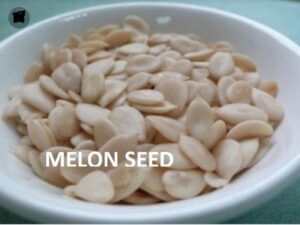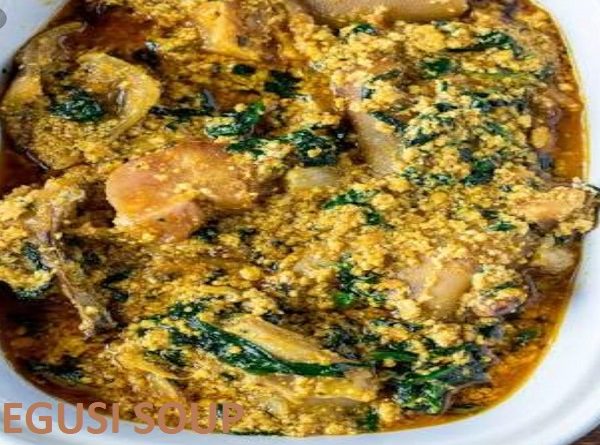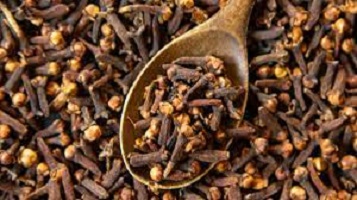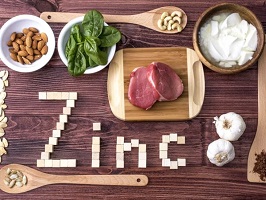How to Make Nigerian Egusi Soup with Lumps
How to Make Nigerian Egusi Soup with Lumps
Egusi soup is one of the most popular Nigerian soups. Egusi aka Egwusi soup is an exotic soup that is cooked, in various parts of West Africa and goes under different names.
It is known as Miyan Gushi in Hausa, Ofe Egusi in Igbo, and Efo Elegusi in Yoruba. In Cameroon, it is sometimes used to make Egusi pudding; a highly addictive pudding.
The main ingredient in preparing Nigerian Egusi Soup with Lumps is melon seeds, which also serve as a thickener.
The melon seeds are a rich source of proteins, vitamins, omega 3 and omega 6 fatty acids, magnesium, zinc, copper, potassium, and more.
However, these seeds are high in calories, so you need to be mindful of your portions. One cup of ground melon seeds contains roughly 600 calories.
Melon soup is one of your best bets if you are looking for a delectable dish. Eaten by all tribes and loved by foreigners too.
Egusi is a wild member of the gourd family, with very dry skin and bitter flesh. Egusi or melon seed looks the same as watermelon seeds but tastes quite differently.

Egusi seed is also used to cook vegetables or added to ogbono and okra soup.
Each household in Nigeria has its way of making African melon soup more appealing.
Also Read: How To Prepare Ogbono Soup Using The Boiling Method.
How to Prepare Nigerian Egusi Soup with Lumps
You can prepare egusi soup using the following methods:
- With lumps
- Boiling Method
- Frying Method
- Caked Egusi soup
- With/without vegetables
- With garlic
The cooking methods are simply a matter of preference. All that matters is getting it right.
Also, make sure that the ground egusi seeds are properly cooked/fried, to get the raw taste out.
Egusi Soup Recipe – How to Prepare Lump Egusi Recipe – Nigerian Egusi Soup with Lumps
This is a method where you mold the ground egusi into balls and cook with the soup such that you will be eating the egusi balls like meat while enjoying the meal.
To cook egusi soup with lumps, you need the following Ingredients:
- ½ cup blended onions about 1- 2 and fresh chilies, to taste
- 4 cups Egusi melon seeds, ground or milled
- ½ cup palm oil
- 1 teaspoon of fresh ogiri or Dawa Dawa or okpei or Iru (locust beans)
- Ground Usu (very optional)
- Salt to taste
- Ground crayfish to taste
- Seasoning cubes
- Cooked meat – goat, beef, fish, chicken (optional), or shellfish. Quantity and variety depend on personal preference
- 2 cups cut pumpkin leaves
- 1 cup water leaf cut
- 3 tablespoons bitter leaf washed
How to Prepare the Egusi Paste ~ Nigerian Egusi Soup with Lumps
Firstly, blend Egusi seeds, Usu, fresh pepper, and onions. Then, add little warm water and salt.
After that, mix thoroughly until you have a firmer doughy consistency. Shape into teaspoon ball sizes and put aside
Wash Your Bitter Leaf
Make sure that you wash the bitter leaf (onugbu) very well so that the bitterness will not spoil your soup. Please watch: (VIDEO) How To Prepare Bitter Leaf Soup The Eastern Way
However, it is best to remove over 95 percent of the bitter taste before using it to cook.
If you buy the already-washed bitter leaf from the market, it is best to boil for about ten minutes before using it, as this would further remove the bitter taste.
Make the Soup ~ Nigerian Egusi Soup with Lumps Recipe
- Firstly, add palm oil to a medium-sized pot, warm on low heat for a minute, and then add the locust beans.
- Secondly, add the stock and set it on low heat to simmer.
- Thirdly, put the balls of the Egusi paste mixture into the stock. Make sure to keep the ball shape in one piece.
- Do not stir in the mixture, just cover the pot and allow simmering for 20 – 30 minutes so the balls will cook very well.
- Then, add the meat and fish or any other protein of choice.
- After that, add the shredded pumpkin leaves and water leaves.
- Gently mix well and put the lid on and allow cooking for 2-3 minutes.
- Finally, add the bitter leaf, remove the lid and cook for another 5 minutes. Stir very well and adjust for seasoning.
Summary on How to Nigerian Egusi Soup with Lumps
You can serve Egusi traditionally with starch. Possible starch options include Iyan (Pounded yam), Garri (fermented cassava), elubo (fermented yam), or semolina.
Equally important are the vegetables you use in the preparation of egusi soup. It goes a long way in defining the taste of the soup.
Great choices are ewuro (bitter leaf), Gbure (water-leaf), amunututu (Malabar spinach), uziza, tete (calallo), spinach, ugu (fluted pumpkin leaf), and kale, collard, and or scent leaf (efirin).
Yoruba-style egusi contains iru and is prepared with a stew or sauce base (sans tomatoes), best for parties.
The major factor that differentiates Yoruba-style egusi soup from other Nigerian egusi soups is the presence of lumps/clumps. Egusi is just as finger-licking as meat in this lumpy form.
FAQs
How do you make clumpy egusi?
Do not stir. Unless it is burning, cover the pot and stew without stirring for 15 minutes before lowering the heat even more and giving the soup a gentle toss.
This will prevent the clumps of egusi from separating before they set.
What is the English name for egusi?
The name “egusi” refers to the protein-rich seeds of some cucurbitaceous plants (squash, melon, and gourd), which are a staple in West African cooking after being dried and powdered.
Other names for egusi include “egwusi,” “agusi,” “ohue,” “Ikpan,” “Ikon,” and “agushi.”
What ingredients are in Nigerian egusi soup?
The main ingredients in egusi soup are awara (Nigerian tofu), mushrooms, meat (such as beef, smoked poultry, goat, cowhide, and offal), and seafood (smoked dried fish or stockfish) as well as awara (Nigerian tofu), mushrooms, and greens
Can I put scent leaf in Egusi soup?
SCENT leaf is a common ingredient in egusi and pepper soups, among other varieties of soup.
Due to its fragrant flavor and scent, this green vegetable can be used to make yam and other porridge as well as tea and other beverages.
What melon is egusi?
A wild gourd endemic to West Africa called Egusi, also known as Citrullus lanatus, is a relative of the watermelon.
The fruit is not consumed; instead, the gourd’s seeds are gathered and used as a food source.
Which country owns egusi?
The majority of tribes in Nigeria and elsewhere produce and eat egusi soup, which is undoubtedly the most well-liked soup in the country
The main ingredient in West African cuisine, egusi, is prepared from the fat- and protein-rich seeds of some cucurbitaceous plants (squash, melon, and gourd).
Is egusi good for your health?
Vitamin A, which is essential for the formation and upkeep of healthy bones, is abundant in egusi seeds.
Additionally, Egusi seeds contain significant amounts of vitamins B1 and B2, which are critical for the development and synthesis of red blood cells.
Is egusi soup beneficial for losing weight? Is Egusi soup good for weight loss?
Another treat that you can have while following a ketogenic diet is egusi soup. This nourishing soup is made in Africa mostly from melon seeds.
It also has a lot of meat, fish, and other nutritious proteins. It is a top source of vitamins A, B1, and C.
How much is egusi in Nigeria?
₦4,129.00 per 1 paint bucket.
What tribe is Egusi soup from?
The Yoruba tribe
Describe Egusi Soup ~ what is Egusi Soup?
A Nigerian soup called egusi comes from the Yoruba people. Over 200 distinct tribes exist in Nigeria, and each one has its own unique culture, language, and cuisine.
How long will ground egusi keep? How long can grinded egusi last?
Since ground egusi contains oil, it should be used as soon as possible because it quickly gets rancid (it should keep well in the freezer for a month or two).
Is egusi protein or carbohydrate?
Kernels from egusi (Colocynthis citrullus L.) have a 52.0% oil content, 28.4% protein content (60% in defatted flour), 2.7% fiber content, 3.6% ash content, and 8.2% carbohydrate content.
Can Egusi soup be reheated?
Reheat leftovers in a pot over low heat with a little water, or in a bowl with water, covered with plastic wrap, and heated for one minute in the microwave.
What is the side effects of egusi?
The following are some dangers and side effects of bitter melon:
- Diarrhea, vomiting, and other intestinal issues.
- Vaginal bleeding, contractions, and abortion.
- Dangerous lowering of blood sugar if taken with insulin.
- Liver damage.
- Favism (which can cause anemia) in those with g6pd deficiency.
Is egusi heart-healthy?
The high proportion of “unsaturated” fatty acids in egusi makes it good for the heart since it lowers blood cholesterol levels, which are considered to be detrimental to the organ. This lowers the risk of heart disease.
Is egusi soup healthy for lowering cholesterol?
Ogbono has anti-inflammatory properties, increases levels of high-density lipoprotein (good) cholesterol, and encourages weight loss.




Pingback: Nsala Soup: Nigerian White Soup Recipe - 9jafoods
Pingback: Pounded Yam | How to Pound Yam from Scratch
Pingback: Amala Food: How to Prepare Amala (Dark Brown Yam Flour) - 9jafoods
Pingback: Nutrition and Difference between Okazi, Uziza, & Utazi leaves - 9jafoods
Pingback: Afang Soup Nigerian Recipe: A Step By Step Guide - 9jafoods
Pingback: Fried Egusi Soup with Uziza Leaf - Ofe Egusi and Uziza Recipe - 9jafoods
Pingback: Oatmeal fufu Recipe (Nigerian Healthy Swallow) - 9jafoods
Pingback: Fufu and Egusi near me ~ African Restaurants in Lagos - 9jafoods
Pingback: Nigerian Egusi Soup: The Best Guide to Making a Soup Recipe - 9jafoods